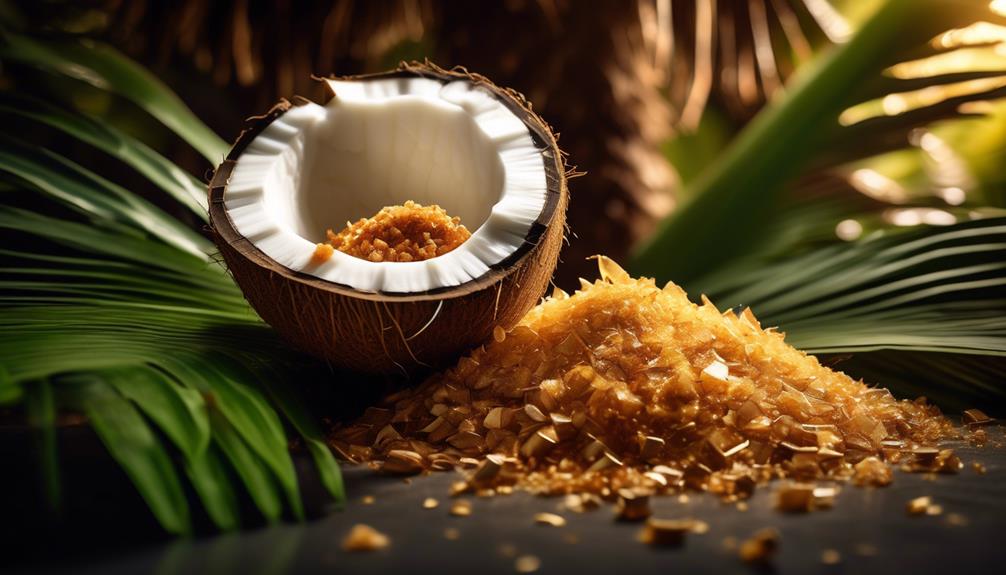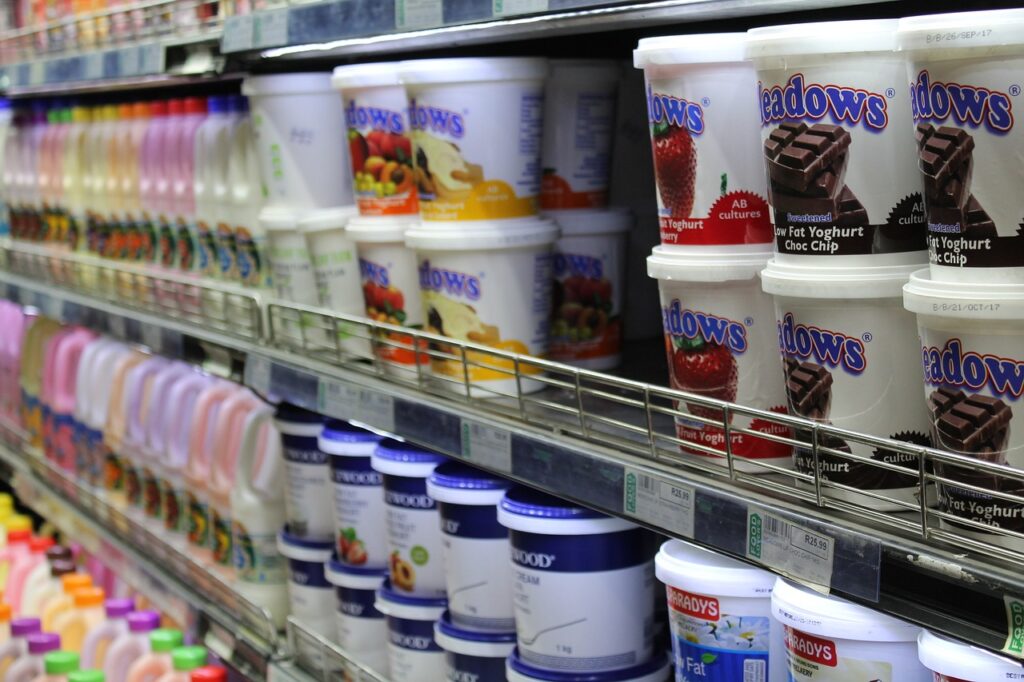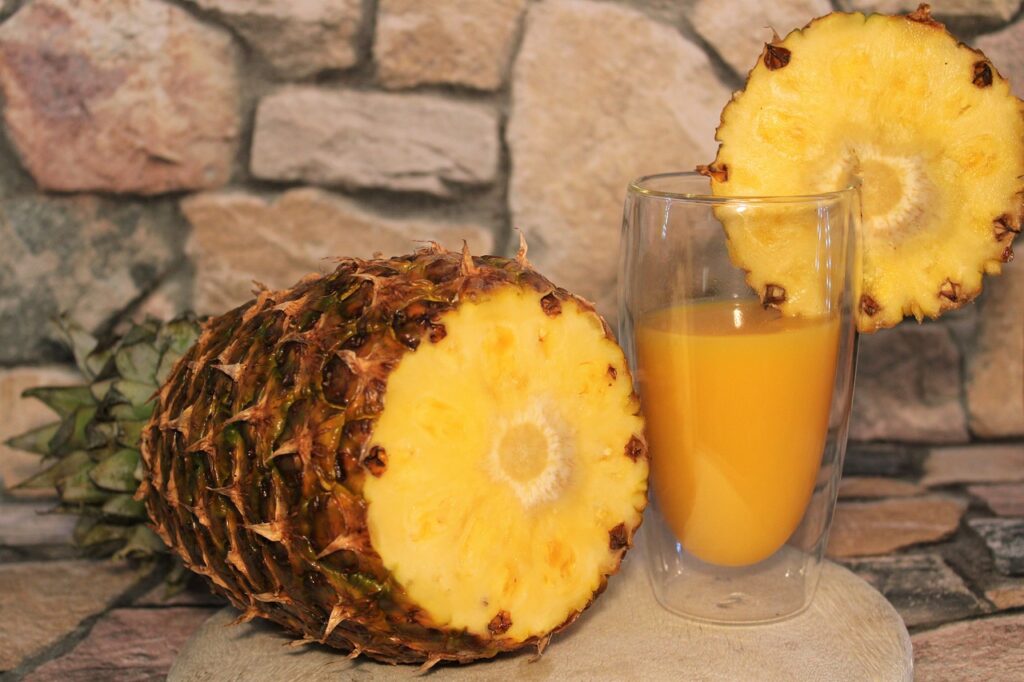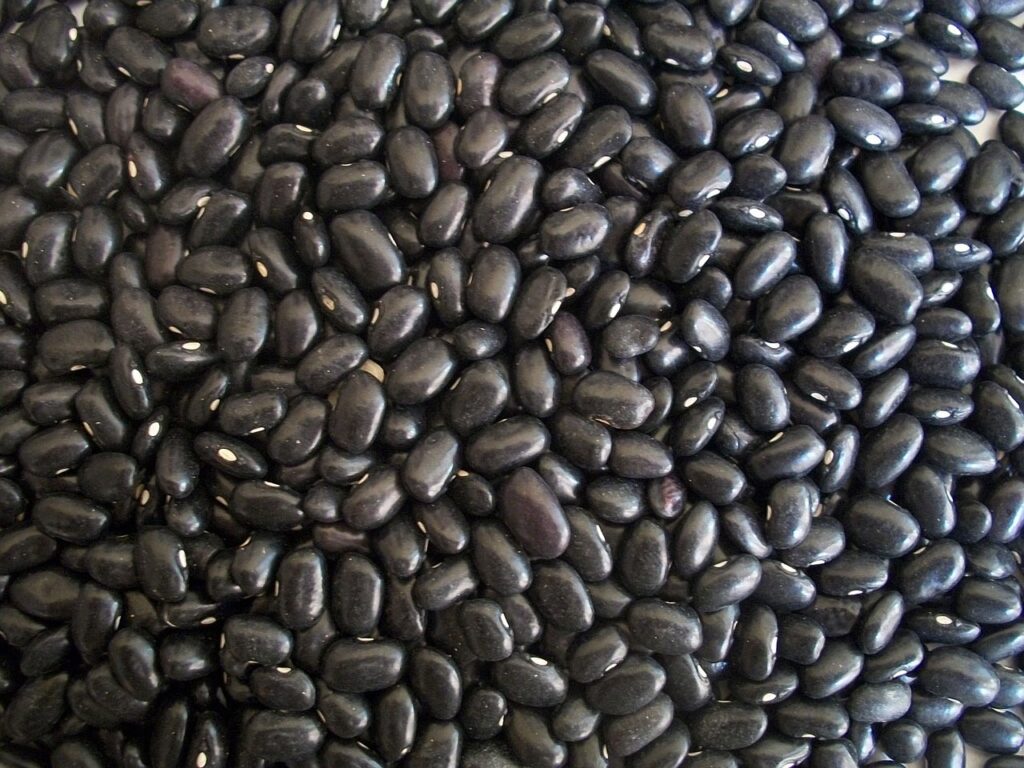Are you following a dairy-free keto diet and looking for sugar substitutes to satisfy your sweet tooth? Well, you're not alone. According to a recent study, the number of people adopting a dairy-free keto lifestyle has been steadily increasing by 15% each year.
But fear not, because in this discussion, we will explore the top sugar substitutes that are not only suitable for a dairy-free keto diet but also provide a deliciously sweet taste without derailing your low-carb goals.
So, whether you're a fan of natural sweeteners like stevia or prefer the zero-calorie options of artificial sweeteners, we've got you covered. Stay tuned to discover the perfect sugar substitutes that will make your taste buds sing while keeping you on track with your dairy-free keto journey.
Stevia

Stevia is a natural sweetener derived from the Stevia rebaudiana plant and offers a zero-calorie and low-carb alternative to sugar. As a nonnutritive sweetener, it can be a valuable addition to a dairy-free keto diet.
Stevia is significantly sweeter than regular sugar, meaning that you'll need less of it to achieve the same level of sweetness in your recipes. This is particularly important for those following a low-carb lifestyle, as it allows them to enjoy the sweet taste without consuming excessive grams of sugar.
Stevia is available in both liquid and powdered form, making it versatile for various uses. Many people find that stevia blends well with erythritol, another sugar substitute, and this combination works particularly well for baking due to stevia's intense sweetness. However, it's important to be mindful of added ingredients in stevia products, such as maltodextrin, as they can affect blood sugar and insulin levels.
Erythritol
Erythritol, a sugar alcohol with 80% of the sweetness of regular sugar and only 5% of the calories, is a popular sugar substitute for those following a dairy-free keto diet. Here are some important facts about erythritol:
- Lower calorie option: With only 5% of the calories of regular sugar, erythritol is a great choice for those on a low-carb or keto diet. It can help satisfy your sweet tooth without derailing your diet.
- Blood sugar control: Studies suggest that erythritol may help lower blood sugar levels. This makes it a suitable option for individuals with diabetes or those looking to maintain stable blood sugar levels.
- Digestive-friendly: Unlike other sugar alcohols, such as xylitol or maltitol, erythritol is well-tolerated by most people and doesn't cause digestive issues or bloating when consumed in moderate amounts.
- Baking and cooking: Erythritol can be used as a substitute for sugar in baking and cooking. However, it may result in a slightly gritty texture. To overcome this, you can try combining erythritol with powdered Monk Fruit sweetener for a smoother texture.
Monk Fruit

Monk fruit sweetener, extracted from the monk fruit and known for its zero calories and carbohydrates, is a popular natural sugar substitute for those following a dairy-free keto diet. This sweetener is derived from the fruit's mogrosides, which are antioxidants that provide the sweetness. Monk fruit sweetener can be 100-250 times sweeter than regular sugar, meaning a little goes a long way.
One of the key benefits of monk fruit sweetener is its potential to help manage blood sugar levels. While more research is needed, studies suggest that monk fruit sweetener may stimulate insulin release without affecting blood glucose levels. This makes it an attractive option for individuals on low carb diets, such as the keto diet, who need to watch their blood sugar levels.
Another advantage of monk fruit sweetener is its natural origin. Unlike artificial sweeteners, monk fruit sweetener is derived from a plant and doesn't contain any artificial additives. This can be appealing to those who prefer to consume natural ingredients.
It is important to note that when using monk fruit sweetener, it's essential to check the ingredients label. Some products may contain added sugars or other sweeteners, which can affect the overall carb and calorie content. Opting for pure monk fruit sweetener without any additional ingredients is the best way to ensure it aligns with a dairy-free keto diet.
Xylitol
Looking for a sugar substitute that won't raise your blood sugar or insulin levels? Xylitol might be the answer.
This sugar alcohol contains 4 grams of carbs per teaspoon but doesn't count as net carbs. It can be used in a variety of ways, from adding a low carb flavor boost to your drinks to using it in baking (with some adjustments).
Benefits of Xylitol
Xylitol, a sugar alcohol commonly found in sugar-free gum, candies, and mints, offers several benefits for those following a dairy-free keto diet. Here are four reasons why xylitol can be a great addition to your low carb, ketogenic lifestyle:
- Low Carb: Xylitol contains only 4 grams of carbs per teaspoon, making it a suitable choice for those on a low carb diet.
- Blood Sugar Control: Unlike regular sugar, the carbs in xylitol don't count as net carbs and don't raise blood sugar or insulin levels. This can be especially beneficial for individuals trying to maintain stable blood sugar levels.
- Sweet Taste: Xylitol provides a sweet taste that's similar to sugar, making it a satisfying replacement for those craving something sweet on a keto diet.
- Versatile: Xylitol can be used in various ways, such as adding it to tea, coffee, shakes, or smoothies for a low carb flavor boost. It can also be used in baking, although it may require extra liquid and can cause digestive problems in high doses.
How to Use Xylitol
When incorporating xylitol into your dairy-free keto diet, there are several ways to enjoy its benefits without compromising your low carb lifestyle.
Xylitol can be used as a sweetener in tea, coffee, shakes, or smoothies, providing a low carb flavor boost.
It can also be used in baking, although it may require extra liquid and can cause digestive problems in high doses.
Keep in mind that xylitol contains 3 calories per gram and 4 grams of carbs per teaspoon. However, the carbs in xylitol don't count as net carbs and don't raise blood sugar or insulin levels.
If you're looking for sugar-free gum, candies, or mints, you'll likely find xylitol as a common ingredient.
Enjoy the benefits of xylitol in your keto diet while maintaining your low carb and blood sugar levels.
Xylitol Vs Other Sweeteners
Xylitol is one of the many sweeteners available on the market, and it's often compared to other alternatives. Here are four key points to consider when comparing xylitol to other sweeteners:
- Low Carb and Blood Sugar Friendly: Xylitol contains 4 grams of carbs per teaspoon, but these carbs don't count as net carbs and don't raise blood sugar or insulin levels. This makes it a suitable option for those following a low carb or keto diet.
- Stevia and Monk Fruit: Xylitol is often compared to other keto sweeteners like stevia and monk fruit. While stevia and monk fruit are both zero calorie sweeteners with a low glycemic index, xylitol provides a more similar taste and texture to sugar.
- Baking and Digestive Issues: Xylitol can be used in baking, but it may require extra liquid and can cause digestive issues in higher quantities. It's important to use xylitol in moderation and be mindful of your digestive tolerance.
- Personal Preference: Choosing the right sweetener ultimately depends on personal preference. Some people may prefer the taste of xylitol, while others may prefer the taste of stevia or monk fruit. Experimenting with different sweeteners can help find the one that suits your needs and taste buds.
Remember to consider your dietary goals, taste preferences, and potential digestive issues when deciding between xylitol and other sweeteners.
Inulin
Inulin, a prebiotic fiber naturally found in plants such as chicory root, garlic, and onions, is a low-carb sweetener often used in keto-friendly products due to its minimal impact on blood sugar levels. This makes it a great sugar substitute for those following a dairy-free keto diet. Inulin can be used in baking and cooking as a replacement for sugar, but it may require adjustments in the recipe due to its unique properties.
One of the best things about inulin is its low carb content. It contains only 1.5 grams of net carbs per teaspoon, making it a suitable option for those looking to minimize their carbohydrate intake. In addition, inulin is found naturally in plants, making it a more natural choice compared to other artificial sweeteners.
Another benefit of inulin is its potential to support gut health. It acts as a prebiotic fiber, meaning it can help nourish the beneficial bacteria in your gut. This can lead to improved digestion and overall gut function.
It's important to note that inulin isn't as sweet as sugar, so you may need to use more of it to achieve the desired level of sweetness. Additionally, some people may experience digestive issues when consuming large amounts of inulin, so it's best to start with small doses and gradually increase if tolerated well.
Allulose

Allulose offers several benefits for a dairy-free keto diet. It's a natural sweetener that has minimal impact on blood sugar and insulin levels, making it suitable for those following a low-carb lifestyle.
Allulose can be used as a 1:1 substitute for sugar in recipes, providing a similar taste and texture without affecting ketosis.
Benefits of Allulose
For those on a dairy-free keto diet, there's a low-calorie sweetener that offers the sweet taste of sugar without the high calorie or carbohydrate content. Allulose, a natural sugar found in small quantities in fruits like figs and raisins, has gained popularity as a low carb sweetener.
Here are the benefits of incorporating allulose into your diet:
- Minimal impact on blood sugar: Unlike regular sugar or high fructose corn syrup, allulose doesn't significantly raise blood sugar levels. This makes it suitable for those following a low carb or keto diet.
- Versatility in cooking and baking: Allulose can be used as a 1:1 substitute for sugar in various recipes, making it a versatile option for keto-friendly dishes.
- Low glycemic index: Allulose has a low glycemic index, meaning it doesn't cause a rapid spike in blood sugar levels like traditional sugar does.
- Natural sweeteners: Allulose is a natural sweetener derived from sources like the Stevia rebaudiana plant or monk fruit extract. It provides a sweet taste without the added calories or carbohydrates.
How to Use Allulose
To incorporate allulose into your recipes, follow these tips for using this versatile sugar substitute.
- Allulose is a low-carb keto-friendly sweetener that's 70% as sweet as sugar, so you may need to use a slightly larger amount for a sweeter taste.
- It's also important to note that allulose doesn't raise blood sugar or insulin levels, making it suitable for those following a keto diet.
- When baking with allulose, keep in mind that it has a lower melting point than sugar, so reduce the oven temperature and baking time to prevent browning.
- Additionally, allulose can add moisture to recipes, so adjust the liquid content accordingly.
With its sweet taste and keto-friendly properties, allulose is a great option for those looking to reduce sugar intake while still enjoying a sweet treat.
Allulose Vs Other Sweeteners
When comparing different sweeteners, it's important to consider the qualities and benefits of allulose in relation to other options available. Here are four key points to keep in mind:
- Lower Glycemic Index: Unlike other sweeteners, allulose has a much lower glycemic index, meaning it doesn't significantly affect blood sugar levels. This makes it a suitable choice for those concerned about managing their blood sugar and insulin levels.
- Keto-Friendly: Allulose is keto-friendly because it has minimal impact on blood sugar and insulin. It contains only a fraction of the calories found in regular sugar, making it an attractive option for those following a low-carb or ketogenic diet.
- Similar Taste and Texture: Allulose offers a similar taste and texture to sugar, making it a versatile substitute for baking and cooking. It can be used in a 1:1 ratio in most recipes, allowing you to enjoy your favorite sweet treats without compromising your dietary goals.
- Check the Ingredients Label: When choosing a sweetener, it's crucial to check the ingredients label for the number of carbs per serving. While allulose is low in carbs, it's still high in calories, so moderation is key for those watching their calorie intake or managing insulin resistance.
Considering these factors, allulose emerges as a favorable option for those on a dairy-free keto diet.
Chicory Root

Derived from the roots of the chicory plant, chicory root is a low carb keto sweetener that offers a wide range of benefits for those following a dairy-free keto diet. It's a popular option among sugar substitutes due to its low glycemic index, making it suitable for those on a low carb diet.
Chicory root contains inulin, a soluble fiber that can aid in digestive health. This sweetener can be used in baking and cooking, providing a natural sweetness without the added sugars or sweeteners that can negatively impact blood sugar levels. It's important, however, to check for added ingredients such as maltodextrin or dextrose, as they can increase the overall carbohydrate content.
Chicory root sweeteners can be a great alternative to traditional sweeteners like agave nectar, which can be high in fructose and impact blood sugar levels. With its versatility and health benefits, chicory root sweetener can be a valuable addition to a dairy-free keto diet.
Date Sugar
Date sugar is a natural and unprocessed sweetener, made from dried and ground dates, that can be used as a healthier substitute for regular sugar in a dairy-free keto diet. Here are four reasons why date sugar is a great option for your keto ice cream and other sweet treats:
- Retains Nutrients and Fiber: Unlike refined white sugar, date sugar is unprocessed and retains the nutrients and fiber from dates. This means you'll be getting more than just empty calories when you sweeten your desserts with date sugar.
- Lower Glycemic Index: Date sugar has a lower glycemic index compared to regular sugar. This means it causes a slower rise in blood sugar levels, which can be beneficial for those following a keto diet.
- Versatile in Recipes: Date sugar can be used as a 1:1 substitute for sugar in recipes. It adds a caramel-like flavor to dishes and is suitable for baking and cooking. So you don't have to compromise on taste when using date sugar in your favorite keto desserts.
- Natural and Whole Food: Date sugar is made from dried fruit, making it a natural and whole food sweetener. It's free from artificial additives and chemicals often found in other sweeteners.
Coconut Sugar

Coconut sugar, derived from coconut palm sap, has gained popularity as a natural sweetener. While it's considered a healthier alternative to refined sugar, it's important to note that coconut sugar is still high in fructose and can impact blood sugar control.
When using coconut sugar as a substitute for regular sugar, moderation is key to maintain a low-carb keto diet.
Benefits of Coconut Sugar
When looking for a healthier alternative to regular sugar, coconut sugar emerges as a favorable option due to its natural sweetness and nutrient content. Here are some benefits of using coconut sugar:
- Nutrient-rich: Coconut sugar contains essential nutrients like iron, zinc, calcium, and potassium, which are lacking in regular sugar. This makes it a healthier choice for sweetening your baked goods or other sweet foods.
- Lower glycemic index: Unlike regular sugar, coconut sugar has a lower glycemic index. This means it has a lesser impact on blood sugar levels and is a suitable sweetener for those following a keto meal plan.
- Versatile substitute: Coconut sugar can be used as a 1:1 substitute for regular sugar in most recipes. Its rich caramel-like flavor makes it a great option for baking and cooking.
- Calorie and carb content: While coconut sugar does contain calories and carbs, it isn't as high in carbs as regular sugar. It can provide a sweet taste without the guilt of consuming excess sugar and carbs.
Nutritional Profile of Coconut Sugar
To understand the nutritional profile of coconut sugar, it's important to consider its lower glycemic index, nutrient content, and moderate carbohydrate levels.
Compared to regular sugar, coconut sugar has a lower glycemic index, which means it has a lesser impact on blood sugar levels. This makes it a better option for those looking to control their blood sugar and insulin levels.
Additionally, coconut sugar contains some nutrients like iron, zinc, calcium, and potassium, making it a more nutritious sweetener choice compared to regular sugar.
However, it's important to note that coconut sugar isn't significantly lower in carbs compared to regular sugar. Therefore, it should still be used sparingly on a keto diet.
As with any type of sugar, it's always important to consume it in moderation to prevent weight gain and maintain blood sugar levels.
How to Use Coconut Sugar
Consider incorporating coconut sugar into your recipes as a natural and flavorful alternative to regular sugar. Here are four ways you can use coconut sugar in your baking and cooking:
- Baking: Use coconut sugar in a 1:1 ratio as a replacement for regular sugar in your favorite baked goods. Its rich caramel-like flavor adds a delicious twist to cookies, cakes, and muffins.
- Beverages: Add a subtle sweetness to your coffee or tea by stirring in a teaspoon of coconut sugar. It dissolves easily and enhances the flavor without overpowering it.
- Cooking: Use coconut sugar as a replacement for brown sugar in savory dishes like stir-fries or glazes. Its unique taste adds depth and complexity to your meals.
- Moderation: Keep in mind that while coconut sugar is a lower glycemic sweetener compared to regular sugar, it still contains calories and carbohydrates. If you're following a keto diet, be mindful of your overall carb intake and use coconut sugar in moderation.
Incorporating coconut sugar into your recipes can be a delicious way to enjoy a low-carb, keto-friendly sweetener.
Sugar Alcohols

Sugar alcohols, such as erythritol and xylitol, are commonly used in low-carb and keto diets as sweeteners that have minimal impact on blood sugar levels. These sugar substitutes are derived from naturally occurring sources and provide a sweet taste with fewer calories or carbs than regular sugar. Studies show that sugar alcohols can be a viable option for those following a ketogenic diet who want to reduce their sugar intake without sacrificing sweetness.
One popular keto sweetener is erythritol, which is found naturally in certain fruits and fermented foods. It has been shown in animal studies to have little to no effect on blood sugar levels. Erythritol is also well-tolerated by most people and doesn't cause the digestive issues that other sugar alcohols may have.
Xylitol is another commonly used sugar alcohol in the keto community. It's also naturally occurring and has been found to have minimal impact on blood sugar levels. However, some people may experience digestive discomfort when consuming large amounts of xylitol.
It's important to note that sugar alcohols may have reported side effects such as bloating, gas, and diarrhea. To avoid these issues, it's recommended to consume them in moderation and be mindful of portion sizes.
Additionally, liquid sweeteners like stevia and monk fruit extract can be used as alternatives to sugar alcohols for those who prefer a different taste or experience digestive issues with sugar alcohols.
Artificial Sweeteners
Now let's explore the realm of artificial sweeteners, a viable option for those seeking a dairy-free keto diet without compromising on sweetness. Here are some key facts about artificial sweeteners that you should know:
- Zero Calories and Carbs: Artificial sweeteners like sucralose provide minimal to no calories or carbs, making them a great choice for those on a dairy-free keto diet.
- Suitable for Cooking and Baking: Artificial sweeteners can be used as a substitute for sugar in equal amounts in most recipes, making them convenient for cooking and baking. However, it's important to note that some artificial sweeteners, like sucralose, may not be suitable for baking at high temperatures.
- No Effect on Blood Sugar: Since artificial sweeteners don't raise blood sugar or insulin levels, they can be a safe option for those following a dairy-free keto diet. This makes them particularly beneficial for individuals with diabetes or those looking to manage their blood sugar levels.
- Moderation is Key: While artificial sweeteners can help satisfy your sweet tooth, it's important to use them in moderation as part of a healthy and balanced dairy-free keto diet. This is because relying too heavily on artificial sweeteners may not address underlying sugar addiction or promote long-term dietary habits.
Liquid Sweeteners

Liquid sweeteners offer a variety of options for those following a dairy-free keto diet, providing a natural and low-calorie way to add sweetness to your favorite beverages and dishes.
Stevia and monk fruit are popular choices for liquid sweeteners. They're derived from plants and contain no calories or carbs, making them suitable for those watching their sugar and insulin levels. These sweeteners have been found to have no effect on blood sugar levels, making them a great option for individuals with diabetes or those following a low-carb diet.
Sucralose and yacon syrup are other liquid sweeteners that can be used in drinks, oatmeal, and yogurt. However, they may not be ideal for high-temperature baking.
Erythritol, on the other hand, is a liquid sweetener that can be used in baking and cooking. It has 80% of the sweetness of regular sugar and can be a suitable replacement. However, it may result in a slightly gritty texture in some recipes.
Xylitol is another liquid sweetener that can be used in tea, coffee, shakes, and smoothies to add a low-carb flavor boost. However, it's important to note that high doses of xylitol can cause digestive problems, such as gas and bloating.
Lastly, monk fruit sweetener, available in liquid form, can be 100-250 times sweeter than regular sugar. It contains mogrosides, which are compounds that give it its sweetness and may help manage blood sugar levels.
When using liquid sweeteners in your keto recipes, it's important to consider the taste, as some may have a slightly different flavor compared to regular sugar. However, with the variety of options available, you can find the one that best suits your taste preferences while keeping your carb and calorie intake low.
Baking Sweetener Considerations
When considering baking sweeteners for your dairy-free keto diet, there are several important factors to keep in mind:
- Sweetness Level: Check the sweetness level of the sweetener you choose. Some sweeteners, like Stevia, are significantly sweeter than sugar and may require adjustment in measurements for recipes. It's important to find the right balance to achieve the desired taste.
- Texture Impact: Consider the texture impact of the sweetener. For example, erythritol may result in a slightly gritty texture when used in baking. This is something to keep in mind when selecting a sweetener for your favorite recipes.
- Heat Stability: Be mindful of the sweetener's heat stability. Certain sweeteners, such as sucralose, may not be suitable for baking at high temperatures. Make sure to choose a sweetener that can withstand the heat required for your baking needs.
- Digestive Issues: Evaluate the potential for digestive issues with certain sweeteners. Xylitol, for instance, may cause gas and bloating in high doses. It's important to listen to your body and choose a sweetener that agrees with your digestive system.
Conclusion
In conclusion, when it comes to finding the perfect sugar substitutes for a dairy-free keto diet, options like Stevia, Erythritol, Monk Fruit, Xylitol, and Inulin offer a sweet solution without the added guilt.
These alternatives provide a low-carb and low-calorie way to satisfy your sweet tooth. Remember to use them in moderation as part of a balanced keto lifestyle.
So go ahead and indulge in some guilt-free sweetness on your dairy-free keto journey!







